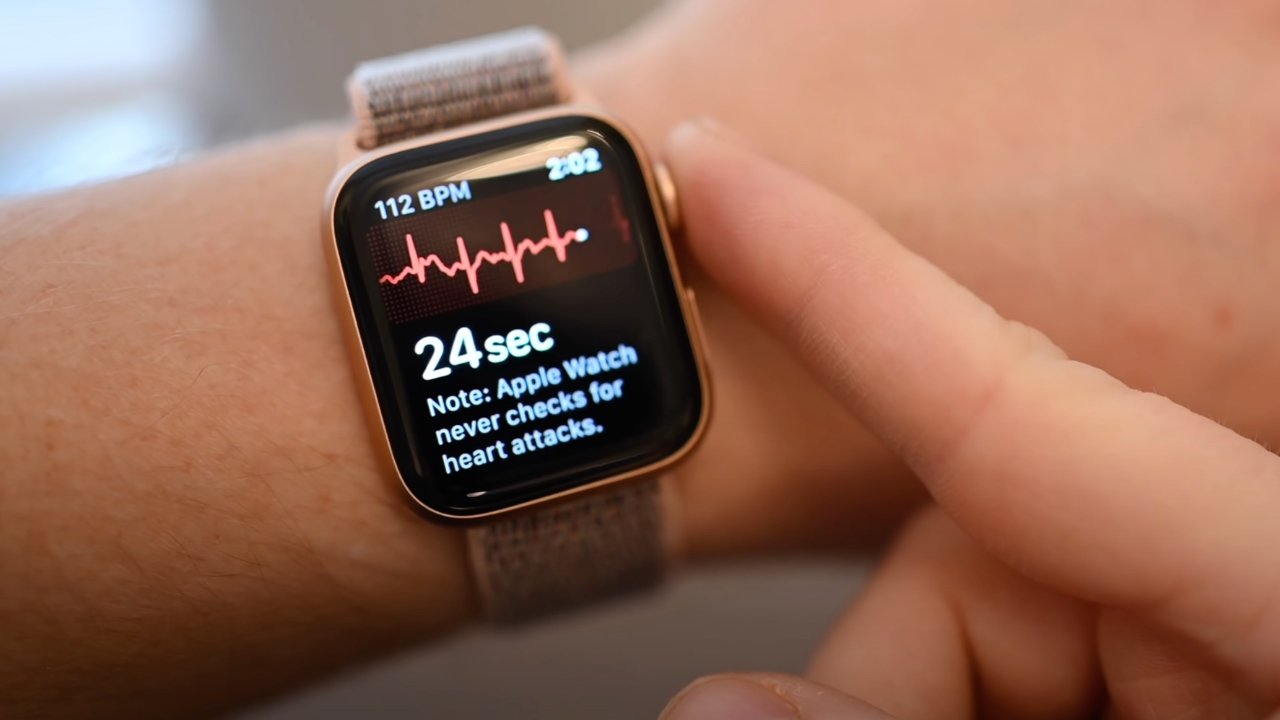New study used Apple Watch to detect weak heart pump in patients
A medical study performed by Mayo Clinic used Apple Watch electrocardiogram data coupled with a custom algorithm to remotely detect a weak heart pump in patients.

Take an ECG from your wrist with an Apple Watch Series 4 or newer
A group of 2,454 Mayo Clinic patients with an iPhone and an Apple Watch with ECG functionality participated in the study. The research concluded that an Apple Watch ECG coupled with a well-developed algorithm could enable the early diagnosis of a weak heart pump.
Mayo Clinic shared the details of the study and the results, stating that the data obtained from the Apple Watch was clean and accurate enough for use. The voluntary participants transmitted 125,610 ECGs from 46 states and 11 countries over the six-month study period.
These ECGs were then passed through an algorithm that was developed using a 12-lead ECG machine. The Apple Watch provides an ECG with only one lead, but Itzhak Zachi Attia, Ph.D., the lead AI scientist in the Department of Cardiovascular Medicine at Mayo Clinic was able to adapt the algorithm for single-lead use.
Of the data collected, 420 patients had an Apple Watch ECG recorded within 30 days of a clinically ordered ECG. This data showed that when paired with the algorithm, data from an Apple Watch resulted in an as good if not better ability to identify a weak heart pump than a treadmill test.
"This test is the first step, as it demonstrates we can get medically useful information from a single-lead watch," says Dr. Friedman." Our next steps include global prospective studies to test this prospectively in more diverse populations and demonstrate medical benefit. This is what the transformation of medicine looks like: inexpensively diagnosing serious disease from your sofa."
A weak heart pump, also known as left ventricular dysfunction, is a condition that affects 2% to 3% of people globally, according to Mayo Clinic. This goes up to 9% of the population for people over 60, and the issue can exist without symptoms or be associated with shortness of breath, leg swelling, or racing heartbeats.
Early identification of a weak heart pump is critical and can lead to lifesaving treatment. However, patients would need to make an appointment and get the expensive in-person treadmill test to detect the problem.
With the algorithm from Mayo Clinic and an Apple Watch, doctors will be able to determine if a person needs treatment for a weak heart pump without them ever leaving their home. This functionality will add to the already lifesaving features of Apple Watch including fall detection and irregular heart rate detection.
Read on AppleInsider

Take an ECG from your wrist with an Apple Watch Series 4 or newer
A group of 2,454 Mayo Clinic patients with an iPhone and an Apple Watch with ECG functionality participated in the study. The research concluded that an Apple Watch ECG coupled with a well-developed algorithm could enable the early diagnosis of a weak heart pump.
Mayo Clinic shared the details of the study and the results, stating that the data obtained from the Apple Watch was clean and accurate enough for use. The voluntary participants transmitted 125,610 ECGs from 46 states and 11 countries over the six-month study period.
These ECGs were then passed through an algorithm that was developed using a 12-lead ECG machine. The Apple Watch provides an ECG with only one lead, but Itzhak Zachi Attia, Ph.D., the lead AI scientist in the Department of Cardiovascular Medicine at Mayo Clinic was able to adapt the algorithm for single-lead use.
Of the data collected, 420 patients had an Apple Watch ECG recorded within 30 days of a clinically ordered ECG. This data showed that when paired with the algorithm, data from an Apple Watch resulted in an as good if not better ability to identify a weak heart pump than a treadmill test.
"This test is the first step, as it demonstrates we can get medically useful information from a single-lead watch," says Dr. Friedman." Our next steps include global prospective studies to test this prospectively in more diverse populations and demonstrate medical benefit. This is what the transformation of medicine looks like: inexpensively diagnosing serious disease from your sofa."
A weak heart pump, also known as left ventricular dysfunction, is a condition that affects 2% to 3% of people globally, according to Mayo Clinic. This goes up to 9% of the population for people over 60, and the issue can exist without symptoms or be associated with shortness of breath, leg swelling, or racing heartbeats.
Early identification of a weak heart pump is critical and can lead to lifesaving treatment. However, patients would need to make an appointment and get the expensive in-person treadmill test to detect the problem.
With the algorithm from Mayo Clinic and an Apple Watch, doctors will be able to determine if a person needs treatment for a weak heart pump without them ever leaving their home. This functionality will add to the already lifesaving features of Apple Watch including fall detection and irregular heart rate detection.
Read on AppleInsider
